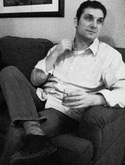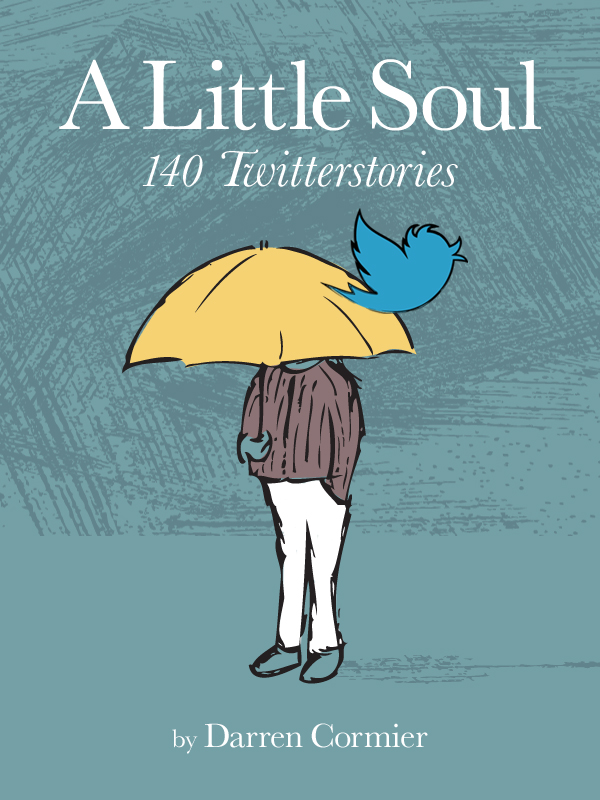“There must be a time
Between the well meaning
When the good will come out
And start the healing
You won't know
How well you've played
Until you've won
And if at first you find
You can't imagine
How good can heal
When you've got nothing worth healing
You won't know
How well you're made
Until you're done”
- The Good Will Out, Embrace
*** *** ***
I don’t want to write right now. I want to be on my couch watching something non-Boston Marathon related; or lying down attempting to fall asleep reading, only to find upon waking up the book bent backwards beneath me; and I want to be drinking something alcoholic while I do any of these.
But instead I’m writing. Because my brain won’t shut off. Because I feel compelled to try to write some kind of decency and humanity and kindness into the world.
Today, two horrific explosions happened in Boston, two blocks away from my office building, at the finish line of the Boston Marathon, one of my favorite events, in front of thousands of innocent, happy, cheering, supportive people. A close friend, who also happens to be a runner, wrote me, “I feel a stronger desire to run than I have in a while, maybe to center myself, maybe in defiance.” Kathrine Switzer, the first woman to run the Boston Marathon, in reaction to the former director literally trying to drag her out of the race at mile 5 famously said, “I could feel my anger dissipating as the miles went by — you can’t run and stay mad!”
These may seem like runner-centric quotes...and they are. But to me they represent more: our inherent strength and perseverance as humans. People train eight months just to finish a marathon to prove their own strength to themselves and nothing more. To the “human insect or poisonous mass of broken sociopaths" (to quote Patton Oswalt) who orchestrated this, by choosing an event that is inherently inspiring to show your depravity and abject fear of humanity, you already lost. Goodness and decency always win out. People ran to the destructed areas to help those who were fallen; strangers and spectators dragged runners and fellow humans to safety; stranded runners and family are staying in homes of people who are acquaintances of acquaintances of friends. The Red Cross’ web site crashed because of an outpouring of donations and people wanting to contribute.
Yes, today was horrific, especially for those who were witness to it all. And there will be fears, anxieties, and traumas that may take years to unfold and recover from. But if nothing else, let today also be a reminder of the compassion and humanity and perseverance that we all have.
There is a lot of good in the world.
New Year's Resolutions.
I don't like them. I don't make them. Sometimes I tell a (bad/obvious) joke that years ago I made a New Year's resolution to not make any resolutions, and I failed. I do make goals, what I want to achieve on both a measurable and a subjective level. Last year I made a handful of goals. I achieved almost all of them, at least the objective ones.
But there is always room for self-improvement. Every year around this time, people across the country... nay, people around the world, will begin to make critical self-assessments, lists of what they believe they can improve, how they want to look, how the new year is going to be different for them, how everything is finally going to change, with a capital C. They'll include things like "lose 15 pounds", "start reading more", "call my parents more often", "exercise more often and maybe run a 5K or a marathon."
I'm calling bullshit.
Everyone making New Year's Resolutions now and waiting until the New Year to start them is going to fail.
I'm not trying to be negative. I'm just trying to slap you all across your self-defeating faces (via this little read blog). If you wait until the New Year to start the things you want to change about yourself now, you're going to fail. And here's why: you don't really mean it. You're going through the motions. If you really wanted to change these things about yourself, you wouldn't wait a few weeks. You'd start now.
It's a simple dictum: if you want to do something, if you want something to change, do it now! By putting it all off until a specified date, you aren't fully engaging in your goals or yourself. You're setting yourself up for failure. For example: "I know I really want to know what all the constellations are and I know it's mid-November and I have a high-speed internet access and I live in the countryside where the city lights don't ruin the night sky and that I'm sitting here watching youtube videos of people getting hit in the nuts or walking into poles, but I think that should be my New Year's Resolution. To learn the constellations." This person (and I've been this person before) is stupid. They could easily achieve this: go online to see which stars are prominent in their hemisphere at that time of year, then go outside to see if they can spot them. Are they going to do this? No, or they would have done so already.
We make resolutions so we can have other people hold us accountable, because we're afraid of holding ourselves accountable. We think that our friends are going to reinforce our lack of will and discipline. They aren't. That doesn't make our friends bad people or that they aren't emotionally invested or excited in seeing you reach your goals. It means that they have their own shit going on and will always (and rightfully so, I may add) take care of their stuff first.
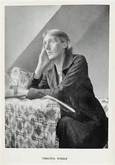 I have created new goals, some measurable, some not. Some are below.- Qualify for the Boston marathon.
- Get two more long stories (over 3000 words) published.
- Read Virginia Woolf (I've always meant to) and Gravity's Rainbow. (I didn't say understand Gravity's Rainbow; just to read it.)
- Be more honest and direct with people.
- Stop making lists.
What are some of your goals?
As always, thank you.
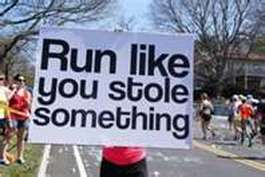 I did not realize it had been over two months since I last updated Scribblings & Bibblings. That said, I can't say I'm going to update it on a much more frequent basis. That would be like claiming you're going to follow through on every one of your New Year's Resolutions, or vowing to never do something again after you've embarrassed yourself. ("I am never drinking/watching Real Housewives/eating that many donuts/talking to her/him [fill your own blank] again.") But I will say that I will try to try to update this more frequently.
As most everyone who knows me knows, I am training for a marathon in October: the Hartford Marathon to be specific. Back in November 2011, I posted what songs I usually go running to, or what songs I listen to before I go running. Since that time, I have added many songs to my running list, and some of those on the original post have gone by the wayside.
Listed below are the songs I listen to most often before I go running. There is a common thread of hyperactive electronic beats and fast-tempo melodies or guitar riffs. (Lyrics I tend to ignore.) As someone who is a minimal runner--I don't wear headphones or bring anything extraneous (watch, phone, key, beverage) with me on a run--I try to listen to one or two of these songs repeatedly before I go out. Presently, the Weezer and New Order tracks dominate my pre-run ritual.
As before, what songs do you go running to?And, having updated this list, I'm now going to run.
New Order - Temptation
Of Montreal - We Will Commit Wolf Murder
1000 Homo DJs (side project of Ministry) - Supernaut
Weezer - (If You're Wondering If I Want You To) I Want You To
Of Montreal - Heimdelsgate Like a Promethean Curse
(character count: 111; without title: 86)
What Can Keep You Running
That knowing smile or wave when you pass by another running in the opposite direction.
_Running and writing parallel each other: we start off slowly, not knowing where we're going, wanting to stop after a few minutes, but refusing to give in to our more base quitting instincts, and we keep going and keep going convinced that after a while it will become fun, until our momentum takes over, and before we know it, we're lost in the woods or much further out than we anticipated, having lost track of time and thought and distance and pace--which is the exact moment it becomes fun as we've stopped thinking about how much fun we aren't having and think about whatever we're thinking about instead--and the only way to finish is to keep going. (I should explore this symbiosis further at some point.)
It has always been my intention with this blog to occasionally discuss running. I haven't done so.
With this post I am changing that. I decided a year ago to run a marathon in 2012. Earlier this summer I broke my foot, which put my training a little behind schedule. But, as of three weeks ago, I went for an extremely slow 2 mile loop, and have three times since dusted off the Asics, stretched and ignored the creaky whining of my hamstrings, and absorbed the quizzical looks of my roommate when I jog down the steps at 10pm. I still intend to run a marathon in 2012.
Darren Rome Leo, at his blog Thoughtvomit, recently posted about the soundtrack for his novel's protagonist. It is a common question on writer's forums whether we write to music or not and, if we do, what we listen to when writing. This same question is applied to runners.
The songs listed below are the songs I most often go running to and will be listening to a lot of over the next year or so.
What are yours?
A little over a year ago, I posted my reading list for the year 2010. I did not make it through all those books. I did not even make through ten percent of those books. However, this is not a post about my failure to adhere to my reading list, or any list for that matter. But it did get me to thinking about the nature of goals and lists. Trying to read every book on our reading lists is a near-futile act: new books are going to constantly pop up that we are going to want to read. Despite this reality, however, I still have a to-read list for the year 2011, which includes most of the holdovers from last year. And I will address that reading list (plus the nature of trying to choose what to read next) on a future post (perhaps the next one).I have created a goals list for the year 2011, consisting of mostly writing, reading, and running goals, and that I share with you below. 1. To have a total of at least 10-12 stories published. I am presently awaiting publication of my 6th story; 4-6 to go. 2. Submit at least one story a week for publication. 3. Complete a dozen new stories, including three longer ones that have been nagging at me for quite some time.4. Run a half-marathon, in preparation for running an actual marathon in 2012. (side question: should I also create a marathon training blog/online journal?) 5. Read 104 books: 2 books per week. This has since been modified to 52: one book per week. 6. At least two blog posts per week.7. Complete and write critical reviews and interviews with Jim Shepard, Steve Almond, and Dan Chaon (authors I have contacted in the past who agreed to an online interview format.) 8. Read about half of the books from my 2010 reading list.9. To write something every day. Lydia Davis said in an interview in Bomb Magazine: "In the meantime, I started doing these very short stories to break myself out of the rut of not writing or resisting writing. I told myself: You have to write two tiny stories every day. It didn’t matter how silly they were, I just had to finish two one-paragraph stories." I feel that same way. But, when writing those silly one-paragraph stories, I can at least say I'm writing. What are your goals for 2011? How do you plan to reach them?
Since this is only a short run, I can afford to go out a little faster.
Now let me start concentrating on what I think, so I can write that essay when I get home.
I've been wondering lately how many books, how many stories exist about running, and I don't believe there are a lot. On the contrary, I believe there are hundreds, nay thousands of books about running, non-fiction books, essays, etc. But I don't know how much fiction has been written about running, in which running played a major role in the story itself. "The Loneliness of the Long Distance Runner" by Alan Sillitoe, (I should probably re-read that, perhaps even re-read that before I finish this essay, before I name-check it in the middle of this entry for it, but it's already been packed. I could go to the library and check it out, but that would make too much sense, and I'm too lazy.) There's Chariots of Fire by Vangelis. No, that's the soundtrack. Chariots of Fire was written by.... actually it wasn't a book. It was an original screenplay. And I'm sure there are other stories or novels out there written about running, but I can't think of any.
(Maybe I should deliberately write that there isn't much fiction written about running so that I can then get people to correct me in their comments, a deliberate ploy to get readership and comments directed here. Feign ignorance, or let others do my research for me. Or by admitting that that is my intent, will people feel aggravated and put-upon and not make any suggestions at all? Or perhaps I'm just writing about how I'm going to write this essay, and what I thought about while running today to keep with the meta-narrative subtext and theme?) (Or maybe I could just make a list of books that deal with running and do a little research and stop being lazy?) (Or is that last statement a way to get people to think that this self-conscious exercise about writing about writing about running is charming?) (Or is it?) (Ahhhh.... the obnoxious charm of post-modernist, self-conscious meta- writing. When pulled off correctly it's charming. When not, it's obnoxious.)
But seriously, I really can't think off the top of my head of many other stories or novels that deal with running. Perhaps I should read more or do some research. But would that be cheating?
I continually read about Murakami's memoir What I Talk About When I Talk About Running when reading other running blogs and about memoir in general. And I continually wonder if I should read it or not. And I think I should, but is that the Murakami book I want to start with?
I talked to a classmate and friend a few weeks back about wanting to read Somerset Maugham and I asked her what Maugham she recommended I should start with. (I asked this knowing that some authors' works are more inaccessible than others, and I wouldn't recommend Finnegan's Wake for someone who wants to read Joyce.) Her reaction was that if there was anything our MFA program had taught her was that we shouldn't put arbitrary limits on ourselves for what you want to read, because then you'll never get around to reading it. If you want to read something, read it, regardless of how other people have felt about it, or regardless of how "difficult" the work might be or how "unlike" their other works this might be. Just read it.
Perhaps I should take her advice and just read the Murakami memoir on running. And get to his other books later. If I want to read that one book now, I should.
How long do I plan on making this essay? I obviously haven't kept up with the once-per-day regiment I had intended. And if I do intend for this to be published in a semi-serious journal at some point, I should revise it drastically and have an arc and an endpoint in mind. Maybe I could set it up as a marathon, each entry could be a mile marker. However, that does not mean that each entry is what goes through your head as you are running a marathon. But it could be a nice structural gimmick in which readers would know when and where it stopped. Nice idea. (Let's hear it for the cool-down walk.)
When did that song leave my head during the run today?
I should go back and add hyperlinks to this tomorrow or later in the week. But I won't right now. It's pretty late. And I want to get this posted.
Start slow. Don't go too fast. You don't want to burn out your pace and be walking by the end. Start slow.
*** *** ***
Before I started running again in November, I encountered that problem frequently: after not running for months, sometimes years, I would start out trying to run at the same pace that I had run when I was running competitively, when I was 18 years old. But I'm not 18 years old anymore. And I would give myself nasty, tear-inducing shin splints, that felt a large serrated knife jabbed into my calf, turned sideways and pulled up and down.
*** *** ***
A sign of maturity and of personal acceptance is admitting that we aren't who we once were, accepting who we are now, and having the foresight to know what we want to become.
*** *** ***
All these things that I have done (Time truth and hearts)
If you can hold on
If you can hold on, hold on
*** *** ***
Let me try to make that maturity line sound good so I can include it in this essay when I get back.
*** *** ***
And how many anecdotes about running should I include? And should they be redeeming, uplifting, melancholy, or ironic, like the fact that Jim Fixx, the man who popularized running and writing about running, died of a heart attack after returning from his daily run? And how many books about running should I read to contribute to this essay to make it seem more scholarly, learned, and less like a jumble of fragmented thoughts?
For a long time I have wanted to write an essay regarding what goes on through one's head while they are running. The structure of the essay would mirror the patterns of one's thoughts while running: in other words, the essay would be as scattered, fragmented, and stream-of-conscious as the thoughts that pass through one's head during a normal day. I have also for a while now wanted to write a long experimental essay that would take place over the course of time, in which individuals would be free to jump in at any point, an essay that would take into account the concept of time and participation, in which the ending was not written as people are reading it, as it is published. A serial experimental essay. I realized the running essay would be the perfect venue for this type of structure and real-time experiment. Given the recent passing of David Markson, and how his d istinctive latter-day style was equally fragmented, seemingly arbitrary, and random as the firing of synapses in our brains, it seems fitting that I start this now. This essay will be an ode to Markson and will include many of the thoughts that flow through my own head while running. It will be self-reflexive, random, arbitrary; it will include longer sections of research concerning the physiological changes that happens while we run, what chemicals our body releases and how it affects our muscles and our moods; it will contain many grammatical errors as I will be publishing it in real-time. (I will go back and edit each entry, and possibly rearrange the order of each section.) It will also make no sense to anyone who happens to read just one sentence every so often, which, I suppose, is also part of the intent. Overall, the intent of the essay is to show how running and writing are inter-related, to explore their reciprocal, symbiotic relationship: how the activities themselves resemble the stream-of-consciousness style, and how the two can best be described and experienced only during the actual doing of the activity. Both are performed, for the most part, in solitude. (Even with the inclusion of runner's groups or a running partner, or the invention of writers groups, running and writing are ultimately a solitary activities.) A writer is happiest when he is writing, not when the product is finished. A runner is happiest when he is running, not when he sees his time and distance after the run. Also, in an effort at maintaining another continuous project, I will attempt to include at least one new section per day, even if that section is one random sentence. This introduction does not count as a section of the essay. I hope you all enjoy this project. As always, any feedback is well-appreciated. Thank you.
|
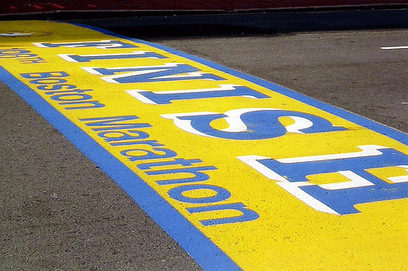
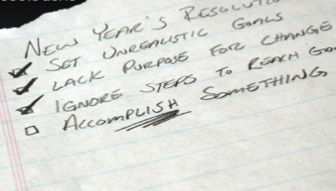


 RSS Feed
RSS Feed